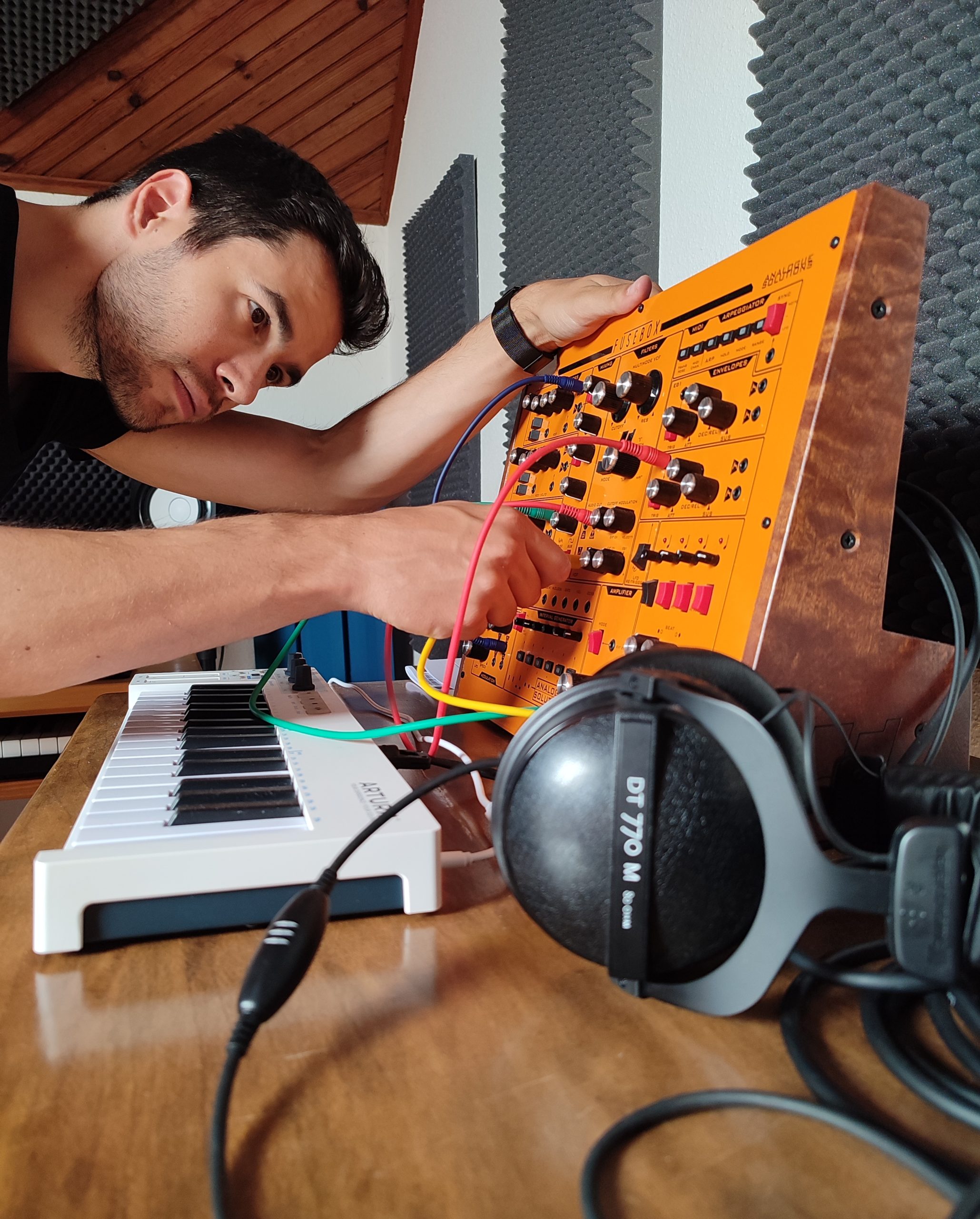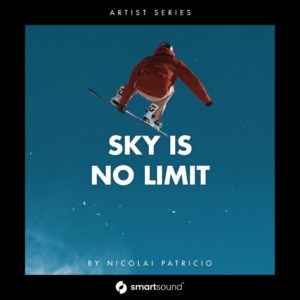Composer Nicolai Patricio on learning the technical side of music, his preferred instrument, and mixed martial arts.
Nicolai Patricio has been rocking on guitar in seaside Portugal for a few decades now. Born and raised there, he makes his living as a professional musician for Dynamedion, and has recently expanded his repertoire to include making albums for Smartsound. Though he normally focuses on fantasy orchestral pieces for video games, he’s broadened his scope to hard rock and metal with the multi-layered album Sky Is No Limit.
Read on this brilliant composer and artist as we chat about his music, extreme sports, video games, and how to break into the music business.
How did you get into music?
I’ve always been into music. When I was a kid, my father had a big vinyl collection, so music was always in the house. He was mostly listening to prog rock, stuff like Pink Floyd and King Crimson. And I still remember listening to that type of music through these big speakers of his. He had really good speakers.
When I was a teenager, my brother started playing bass and got into a band, and I thought it was really cool. He was playing mostly grunge music from the 90s like Nirvana and Pearl Jam. And I think I got inspired to play the guitar then, because I was watching the guitarist and I really liked the guitar. So I started playing guitar when I was 16.
But yeah, I was never very serious into it. I was just playing as a hobby. I went to study Marketing for three years. Graduated university and got a job, and I thought, no way is this going to be my life. No way. It’s not enough for me to have this job and then just do what I like as a hobby. I really have to find something that I really love doing.
So one day, I went into a friend’s house and I played a video game and I really liked the soundtrack of that video game. It was one those games where the soundtrack was really important.
I started thinking, “Well, there’s gotta be someone who has to do all this music.” I researched about film composing and video game composing, and the tools that people use. I started using Cubase and libraries and plugins and so on and I really got hooked. I did nothing with my life for years and years and years. Cubase and sports and not much else.
Were you playing other instruments too?
I was just playing guitar. I played a little bit of fingerstyle guitar and electric guitar, but I was never very serious into it. I think I’m not so much into performing music as I am into creating music. It’s really my passion. Performing is just a way of getting the idea down.

Tinkering on a Fusebox
Do you work more on a guitar or do you use a keyboard setup as well?
It depends on the style of music. Obviously, if I’m going to write a rock track or a metal track—something that’s very guitar orientated—I’ll pick the guitar. But everything else starts with maybe a piano patch on Cubase, or maybe if I’m writing a string melody, I’ll try to start right away with a string patch. If I’m writing something that’s very percussive, I’ll maybe start with the groove . It all just depends on the style of music.
Which styles do you like to write in mostly?
I really like orchestral music, especially when there’s a fantasy theme. Music like Lord of the Rings or World of Warcraft—that style was what really got me into making music.
How did you transition from just making music on your computer as a hobby to a profession?
I always was very pragmatic about it, so I thought if I’m going to make music all the time, I better make money with it. I started writing music with the highest quality possible that I could get so I could build a portfolio.
And that got me an opportunity to make an internship in Hamburg, Germany with a company that doesn’t exist anymore, called Bluwi. They produced music for advertising mostly.
There was a guy there I became friends with after being there for a short while. He happened to also make music for Dynamedion as freelancer. I told him my dream was to make music for fantasy video games. He told me, “I’m working for a company. They produce a lot of music in that style. Maybe you can do an internship there.”
So I sent my portfolio in and they really liked it. I got the internship and immediately had the amazing opportunity to write music for Mortal Kombat X. Getting this chance was surreal at the time for me.
They needed more people to compose music because they had a lot of work at the time and they thought, “Well, let’s try it with Nicolai. Let’s see what he can do.”
I was editing samples during the day and composing at night. That was my life. It was intense, but I really gave it all that I had and it went pretty well. The client liked my music—they liked all our music—and I think that solidified the idea that I could be a composer for Dynamedion.
Since then I’ve been working for Dynamedion and also doing my own jobs here and there and now writing albums for Smartsound as well.
What was your favorite video game that you worked on?
I was able to write a few tracks for Vikings, Wolves of Midgard. And it was really cool, because they gave us references of neo-folk artists, like Wardruna. I love that kind of music and I couldn’t write music exactly like that because it’s very specific, but I was able to put in the right influences into the main style which was orchestral music. I’ve added percussion instruments that you usually don’t mix with the orchestra, like tribal frame drums, shamanistic vocals and shakers. It was really nice because it’s kind of like epic orchestral music for a fantasy game, but with these influences which gave it a different flavor, you know?
So tell us about your album Sky Is No Limit. What was your main influence for writing that?
When I first started with it, I asked myself, what are my strengths? What is the type of music that I really enjoy doing besides this orchestral music that I’ve been doing and I immediately thought about rock/metal music. Ever since I started playing guitar, I was really into this type of heavy music; I started listening to Metallica and Nirvana and later heavier stuff like Korn and Limp Bizkit, and then even heavier stuff like melodic death metal from Sweden, bands like In Flames and Dark Tranquillity as well as American metal bands like Disturbed.
I thought, “Maybe I could do something like this. Maybe Smartsound would like the idea of having an album of this style in their catalog.” So I wrote a few demos and they liked the idea and so I started working on some really solid ideas and doing a ton of research about production in this style of music and a lot of trial and error till I got it right.
What did you enjoy most about making it?
I always liked this style of music, but I never produced it. I’ve always tried to focus more on orchestral music and not getting distracted with too many styles so I could get as good as I can in orchestral music.
I always loved [metal/rock]. I’d always write lots of riffs when I was a kid, but I never got into producing a track which is much more than just writing riffs. First, I had to figure out how to write a good drum beat, because it’s the drum beat that has so many details that compliments the riff. You know there’s so many things you can do with the drum beat that compliments it.
Especially in the more metal genres, the drums get crazy…
Yeah, really intricate and elaborate. So I started doing a lot of research about that and studying like I told you. Trial and error and also figuring out the best structures for these songs. Then came the big challenge, which was what I enjoyed the most working on, the production—getting the sound right for the tracks because that’s as important in my opinion as writing a good riff.
So figuring out how to get a good guitar sound. What is a good guitar sound? What is a good drum sound? And when you get a good drum sound and a good guitar sound, how can you combine them so that they compliment each other.
What is a good bass sound? Usually the bass plays just the tonic of the chord or doubles the riff. That’s usually what’s going on in the bass region. But what is a good bass and what does the bass bring to the overall sound?
I would say getting good sounds and mixing them and mastering the track was really the biggest challenge and what I enjoyed the most.
I also bought a bunch of plugins and did a lot of research on how those plugins work.
Which plugins are you most satisfied with? I’ve bought a lot of plugins too and I probably don’t use 3/4 of them like ever.
That’s normal. So many times you buy one plugin for one occasion.
So which plugins were happy with in the end?
There’s one plugin that I really loved working with called True Iron. It’s a transformer simulator, it stimulates the sound of different transformers, so it’s very subtle and it mainly adds distortion and coloration to the sound. It’s so subtle that many people would tell you “I can’t hear the difference,” but for me it makes a huge difference, especially on the drum bus.
I couldn’t live without using that on the drum because it gives a kind of a 3D depth to the sound that I love.
As mastering compressors I’ve used the Shadow Hills compressor by Plugin Alliance and the SSL compressor by Waves. Also, I couldn’t live without Fabfilter Pro Q3.From the top of my head, those are the main ones.

Tool boxes open and designing in progress
How do you see these tracks being used?
I see them being used in a lot of productions, but when I wrote these songs, I was thinking mainly about sports videos.
It’s definitely the feel I get from the music. Extreme sports.
Sports’ cars, bikes, snowboarding, skateboarding—all those sports with high energy.
Are you into extreme sports yourself?
No, not really. I like watching MMA. Doing it is not for me, but it’s the strategy in MMA that I find really interesting. Like how can a guy that’s physically not so great as the other guy, use some kind of strategy to cancel that other guy’s physical superiority.
It’s not just about kicks and punches.
And they have to think really fast about that too. It’s impressive, but I guess they’re watching lots of videos of the opponent beforehand.
That’s the part that I find the most interesting about it.
It’s probably some good music for MMA too. Do you have any albums planned for the future?
I have some ideas. I think I’m going to write a cinematic trailer album. It will be pretty varied. It’ll go from big impacts to emotional music, action and sci-fi also. So I think I’m going to write a trailer album with a very wide range of styles in it. That’s my idea.
I look forward to hearing it. Do you have any other projects going on?
I’m working on the soundtrack of a video game called Core Decay. It’s a first-person shooter that’s inspired by Deus Ex. It’s an immersive sim, and there are not a lot of those in the market at the moment. I think people are very hungry for more, so I’m really excited to work on it.
I really love the style of music [we’re using for it]. Kind of cyber punk music. I’ve been working a lot on it and I think we’re getting a cool style and not only for the music, but for the graphics too. The graphics are really unique.
I think the gameplay is probably going to be very unique as well, so check it out for sure.
What would you advise for people wanting to get into the music business?
I think it’s very important for you to focus on the quality of your music and get it as good as you can. Understand the technical side of music. Music theory helps a lot to understand how music works.
Understanding how plugins work is very important. At least for me, it’s important to be in control of what I’m doing so I’m not relying on happy accidents to achieve results.
There’s going to be a lot of trial and error, but understanding why something works and why something doesn’t is very important. Understand, for example, a compressor. What is compression and what are the knobs doing and why it works sometimes and why it doesn’t work at other times.
So understanding the technical side is very important, in my opinion. Of course, many people say if you are being too technical, you will lose your intuition. I don’t agree with that. The technical side is like a box of tools that allows your music to get translated. The ideas that you have in your head get translated in a more efficient way.
It’s like if you were a construction worker arriving at a construction site and you wouldn’t pick a tool and think, “Oh how am I gonna use this tool today?” That’s not the process that your mind goes through. If you know the technique, the process that your mind goes through is that: you arrive at the construction site, you see the challenge that’s in front of you, and then you will know what tool to use.







